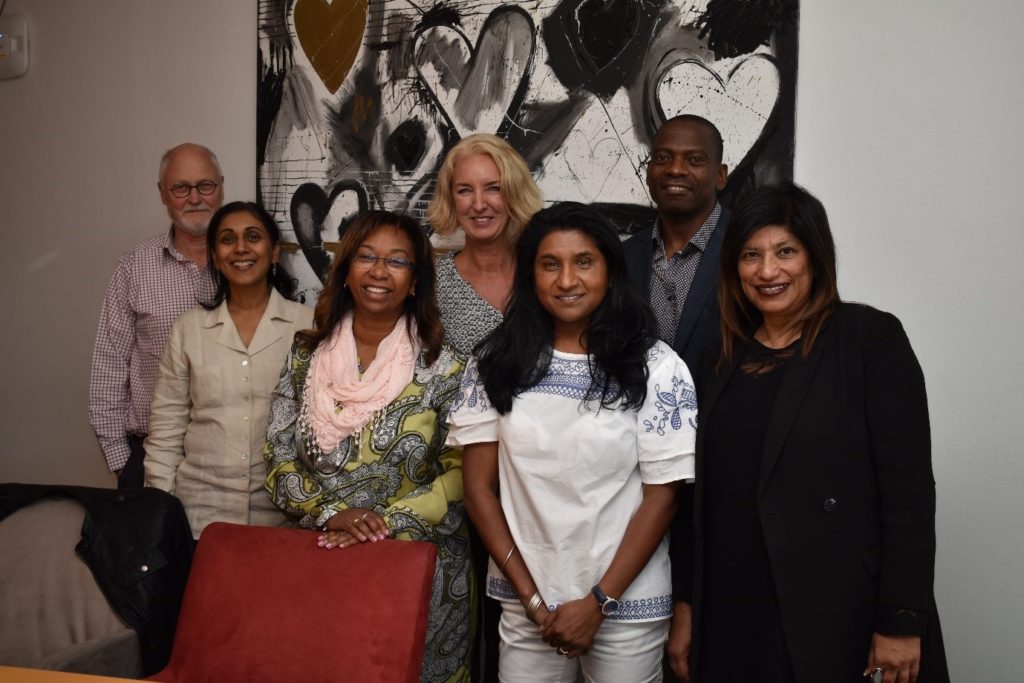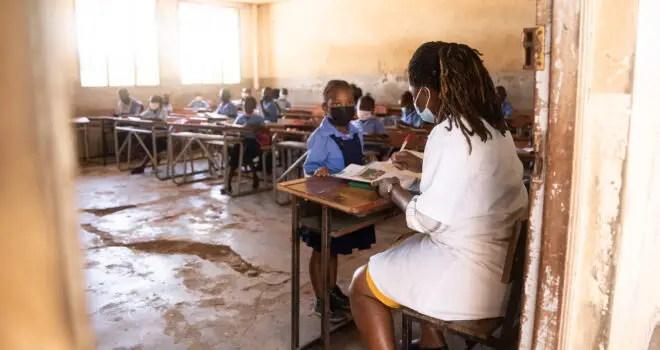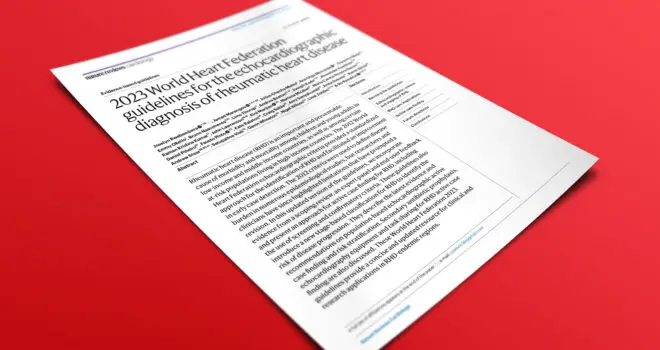
Front row, left to right: Pamela Naidoo, Liesl Zühlke, Pricilla Reddy, Sadiyha Singh
Back row, left to right: John Anthony, Karen Sliwa, Itumeleng Setlhare
On Monday 14th May members of the Department of Health met with experts in noncommunicable diseases (NCDs) at the Hatter Institute for Cardiovascular Research in Africa, Faculty of Health Sciences, University of Cape Town.
Sandhya Singh, Itumeleng Setlhare and Priscilla Reddy from the Department of Health (DOH), Pretoria, met with Prof Karen Sliwa (Senior Cardiologist, Groote Schuur Hospital, Director Hatter Institute and President Elect of the World Heart Federation), Prof Pamela Naidoo (CEO Heart & Stroke Foundation South Africa), Prof Liesl Zühlke (President of SA Heart Association and President of Reach- RHD partnership), Prof John Anthony (Head, Obstetric and Maternal Health, Groote Schuur Hospital) and Prof Peter Zilla (Head, Cardiothoracic Surgery, Groote Schuur Hospital). The meeting was scheduled by the members of the DOH to offer technical support to the Directorate and in preparation to establish an Expert Working Group/s on Cardiovascular Disease (CVD) and Stroke in the second quarter of 2018. The meeting commenced with general introductions and background information on the attendees portfolios.
K Sliwa and J Anthony highlighted the need to implement dedicated cardiac disease in maternity clinics, run jointly by cardiologists and obstetricians, at all tertiary hospitals. These clinical hubs would be responsible for the appropriate referrals of women with suspected cardiac disease in pregnancy to tertiary care, and to assist within an appropriate post-partum management. It was suggested that such services should be one of the priority areas for the DOH as maternal mortality due to indirect causes, such as CVDs, is still very high in South Africa and is likely to become an even larger contributor over the next decade. It was agreed that CVD management and control during pregnancy should be integrated into the strategy on High Risk Pregnancies.
This was followed by an intense discussion on the prevalence of rheumatic heart disease (RHD) contributing to untimely death in young adults in South Africa. K Sliwa and L Zühlke informed the members of the DOH that there is a global shortage of penicillin, the drug needed for primary and secondary prophylaxis. Only 4 companies globally produce penicillin, with 3 of them located in China. The profit margin is small for this essential medication, thus leading to the poor supply. They also reminded the attendees of the critical importance of the pending World Health Assembly Resolution against RHD, which would be the first time that Rheumatic Fever (RF) and Rheumatic Heart Disease (RHD) is recognised as global health priorities on the world stage.
Prof Zilla contributed to the discussion by highlighting the low number of cardiothoracic surgeries performed for patients with rheumatic and congenital heart disease in South Africa. He also provided background on the low-cost valve he and his team has developed at the University of Cape Town, which will go into human studies in 2018.
Prof Liesl Zühlke commented on the need to develop and integrate Congenital Heart Disease (CHD) in the proposed child non- communicable disease strategy. She pointed out that the Incidence of CHD is 1:100-1:150, that CHD was the most common birth defect worldwide and the leading cause of infant deaths in the developed world. Interestingly, CHD is are approximately 60 times more prevalent than childhood cancer and kills twice as many babies than all kinds of childhood cancers combined each year. Yet, funding for pediatric cancer research is five times higher than funding for CHD. As CHD may be a significant factor in under-five mortality in our country, it is key to include it in the proposed NCD child strategy. Prof Zuhlke also emphasised the need for collaborative approaches to the 2030 NDP and the need for an urgent strategy. As President of the South African Heart association, she pledged the commitment of the association in working together with the DOH in addressing the needs around CVD and NCDs in South Africa. Three key suggestions were: 1. Including CHD in the proposed NCD strategy 2. The need for a CVD campaign similar to the recently announced to the cancer campaign and 3. A focus on essential human resources technologies and medicines for CVD with focus on medicines providing primary prevention (Penicillin for ARF/RHD) and secondary prevention (statins, aspirin and thrombolytics).
Prof P Naidoo summarized aspects of the work performed by the Heart & Stroke Foundation on noncommunicable diseases.
The meeting ended with clear goals and overall agreement that the meeting was productive and should be repeated soon.


